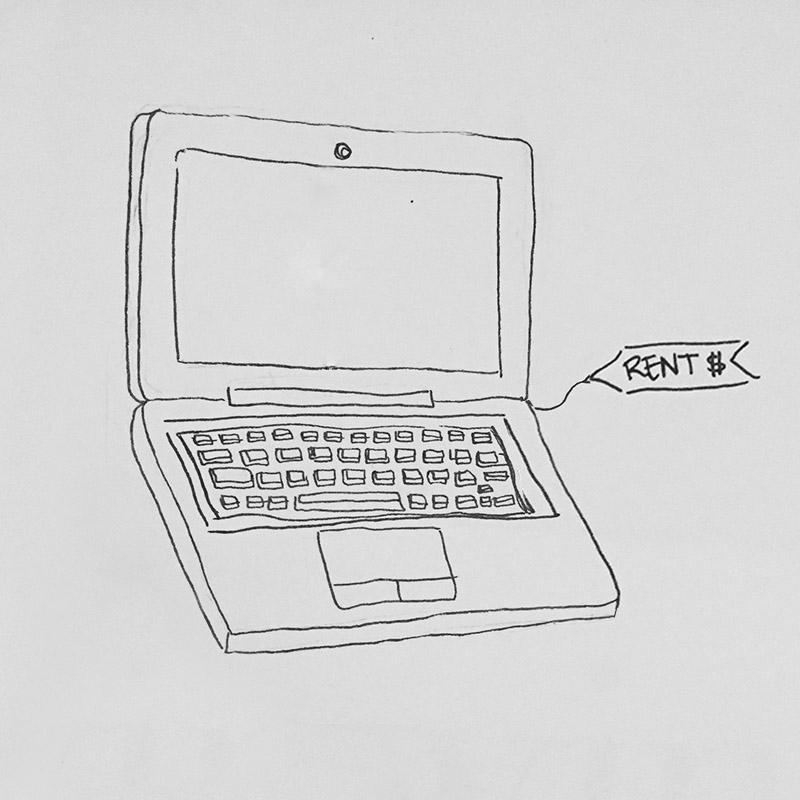A laptop is undeniably one of the most important tools college students utilize in their day-to-day activities. From checking syllabi on BeachBoard to streaming Parks and Recreation in between study sessions, laptops have become almost a necessity for efficiently completing academic and professional tasks.
One bleak finals season, I was in the middle of working on two final projects and a 20-page paper — on some poem that made no sense to me — when my laptop decided to crash. Or, I thought it did. I called tech services, visited a repair shop and discovered that the battery had failed, that something out of my control was going to cost me $540 to repair.
I didn’t have $540 to drop on the machine that was almost brand new to begin with, so I tried to thug it out as much as possible; I used the computers at work, the library and my parents’ computer back home, making edits in between loads of laundry.
Suffice to say, it was a mess. For a whole month, I lacked the convenience of a laptop. I had to make sure my work was safely stored each time for fear of not saving important edits to my final projects. I meticulously searched Cal State Long Beach’s website for any hope of borrowing a laptop somewhere, but to no avail.
So when I visited Tech Day last week, I was reminded of my laptop misfortune and wondered: Why hasn’t the university implemented a laptop rental service for students who, similar to my situation, have found themselves in need of repairs or without the financial assistance to buy a laptop of their own?
The Campus Bookstore offers laptops for rental, but only for onsite use by faculty and staff. This is obviously no help to students; they’re not given the opportunity to receive this resource. Three groups of students can benefit the most from a laptop rental service: students who commute, students of low-income and students who experience long-term hardware issues.
Although the university has two main computer labs — the Spidell Technology Center and Horn Center Labs — an overwhelming amount of students commute to campus. Because they would have to rely on the school’s open access computing facilities, where only 388 computers are available, they risk falling behind in their studies. Those students do not have the flexibility of working at their own convenience, especially if they work off-campus. I know more than a few people who have had to work on class assignments on their breaks and downtime at their places of employment.
Similarly, low-income students without immediate access to online resources are hindered. In 2014-2015, more than 90 percent of college students relied on some form of financial assistance — scholarships, grants, or loans. In many cases, government financial assistance does not cover the entire cost of college; for example, according to the U.S. Department of Education, “[The] maximum Pell Grant covers only about 30 percent of the cost of a four-year public college education.”
Students who encounter long-term hardware issues — like myself — are also affected. This means that those without personal computers or laptops due to technical problems are restricted to only doing homework on campus, which is difficult for students, especially if they live and work off campus. The amount of time they spend researching, studying or typing for class is limited.
Although laptop rental services are extremely common among online college programs, such as Full Sail University and Chatham University, campus-based universities are barely implementing their own forms of such a service. In California, though, it’s worth noting that some CSUs are beginning to undergo their own surge of laptop rental service implementations. Cal State Fullerton has a number of laptops available that the students can rent for up to 120 days (after renewals).
This is something that Long Beach needs to implement ASAP. There are a number of ways we can go about this. If we’re hoping for donations, why not contact Amazon for some high quality, low-cost Chromebooks? We already have a relationship with Amazon, as they have a pickup location now near the Bookstore. We could also look to Apple Inc, Hewlett-Packard or a third-party affiliate.
If donations don’t seem feasible, self-funding is possible. We can spend thousands on a single bomb dog; why not on hundreds of laptops? Additionally, education grants, specific department funding or a Beach Fund campaign are possible sources of revenue.
In terms of hosting this service, different departments on campus are experienced with rentals, technology services and academic accessibility and can operate the service to further promote a learning community. The University Bookstore, the University Library and the Information and Technological Services Department are all qualified to manage this service when the time comes, hopefully.
The university should get on board with this. A laptop rental service would be a monumental resource. If the school wants to remain one of the leading colleges on the West Coast, taking advantage of this opportunity would make the school more desirable and distinct from the rest of the Cal State system.




